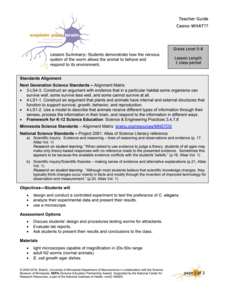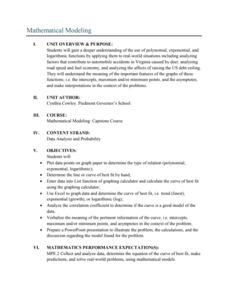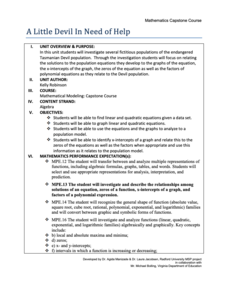Southern Poverty Law Center
Teaching Hard History: A Framework for Teaching American Slavery
Pupils investigate American slavery from colonial times through the Civil War. They incorporate primary sources, video clips, and firsthand accounts to understand how the slavery issue gripped the nation. Essays, presentations, and...
Ohio State University Extension
Teen Leadership
Are the young leaders of tomorrow sitting in your classroom right now? Polish their skills to perfection using a series of teen leadership activities. Each lesson promotes both personal growth and team building, while helping scholars...
Federal Judicial Center
Amistad and Dred Scott—a Comparative Activity
What do slaves fighting for their freedom on board a ship and a slave fighting for his freedom in a courtroom have in common? Budding historians investigate the two different cases of the Amistad slave revolt and the Dred Scott argument....
Newseum
Decoding an Editorial Cartoon
What advantages do political cartoons have over written editorials? Scholars discuss the topic by exploring editorial cartoons. Working in small groups, pupils analyze an Uncle Sam cartoon and complete a worksheet. As a fun extension,...
iCivics
Mini-Lesson: The Incumbent Advantage
Does the person running for re-election have an advantage over the challenger? Scholars explore the concept of incumbent advantage during elections using an informative mini-lesson explaining the legislative branch. In pairs, they...
iCivics
Mini-Lesson: Presidential Succession
Who is in line for the presidency? Learners research the line of succession in the executive branch. They analyze the role the cabinet plays in a situation where the president and vice president are not able to serve. Along the way,...
iCivics
Mini Lesson: Supreme Court Opinions
The court of last resort. Historians research, using current cases and issues, the impact the Supreme Court of the United States has on how our nation operates. They analyze recent decisions made by the nine judges and determine how the...
iCivics
Mini-Lesson: Executive Orders
Can the President of the United States pass a law all by himself? Scholars investigate the concept of the executive order in regards to the powers of the presidency. They use current issues and events to monitor media bias while also...
iCivics
Mini-Lesson: Presidential Appointments
Can the president of the United States hire anyone he or she wants for any position in the executive branch? The answer may surprise scholars! After investigating the appointment process, historians, by themselves or in pairs, analyze...
iCivics
Mini-Lesson: Veto Power
No means no! Scholars analyze the impact of one of the president's most powerful tools—the veto—while also finding out ways to properly check facts for validity. They research the power of the presidential veto with paired activities and...
University of Minnesota
Caeno-WHAT??
Can you feel that? Can you smell that? Since pupils can't ask worms about their sense of smell and touch, they design and complete an experiment to answer these questions. Individuals expose nematodes to different stimuli using their...
Radford University
Government Spending
Spend some time with lines of best fit. An informative unit has learners investigate government spending. They research data on poverty, educational spending, social security, and defense spending, and then analyze lines of best fit for...
Radford University
The Game of Life … Mathematics Style
Make life more organized using mathematics. Scholars get a good look at budgeting and personal finance by using linear equations. They research salary information and costs to develop mathematical models, including equations and graphs.
Radford University
Are Kitchen Cabinets at the Correct Height? Lessons 1-5
Here's a not-so-normal unit on normal heights. Future statisticians anonymously collect class data on female heights, weights, and shoe sizes. They then analyze the data using normal distributions, z-scores, percentiles, and the...
Radford University
Mathematical Modeling: Lesson 1
Will more deer result in more big game licenses? Scholars first research data on the number of deer and the number of big game licenses in Virginia between 1990 to 2009. They apply polynomial, exponential, and logarithmic regression to...
Radford University
Mathematical Modeling: Lessons 2-3
Not all functions are created equal. Pupils apply regression analysis using polynomial, exponential, and logarithmic functions to investigate the relationship between variables and to decide which function would be best to model the...
Radford University
Danger! – An Analysis of the Death Toll of Natural Disasters
Decipher the danger of natural disasters. Using researched data, scholars work in groups to create data displays on the number of deaths from different types of natural disasters. They share their graphical representations with the class...
Radford University
A Little Devil In Need of Help
Math modeling to help endangered species? Scholars first investigate linear and exponential equations and graphs that model fictitious animal populations. They consider how key features of the graphs relate to the situation. As a final...
Radford University
Right Triangle Sports
Who knew math could help with sports? An invigorating set of lessons encourages learners to apply right triangles in baseball, volleyball, hockey, football, and soccer. They use the Pythagorean Theorem, Pythagorean triples, special right...
Radford University
Budgeting Your Time and Money
Use mathematics to better manage money. Pupils learn about budgets and personal finance with a set of three lessons. They research salary data for their chosen careers, look up various costs of living to develop budgets, and plan an...
Radford University
Pollution and Curves of Best Fit
Don't put the resource on curves of best fit out on the curb. Using researched data on trash and recycling, scholars create scatter plots and regression curves to analyze the information. As a culminating activity, they complete projects...
Radford University
Are You Faster than Bacteria?
Just how fast does bacteria grow? Over the course of three lessons, pupils investigate exponential growth with the use of bacteria growth. During the lesson, bacteria from a cell phone is grown to make a connection to real life. Using...
Radford University
Triangular Irrigation
Try to keep the pipe short. Learners investigate where to place a water pump to use the least amount of pipe. Scholars use their knowledge of reflections and congruent triangles to find the best location for the water pump. Finally, they...
Radford University
Understanding Local Economic Issues Using Statistics
A good understanding of local economics requires a lot of data. Scholars design and conduct an experimental survey to collect information about economic issues affecting their regions. They analyze their findings and prepare a...

























